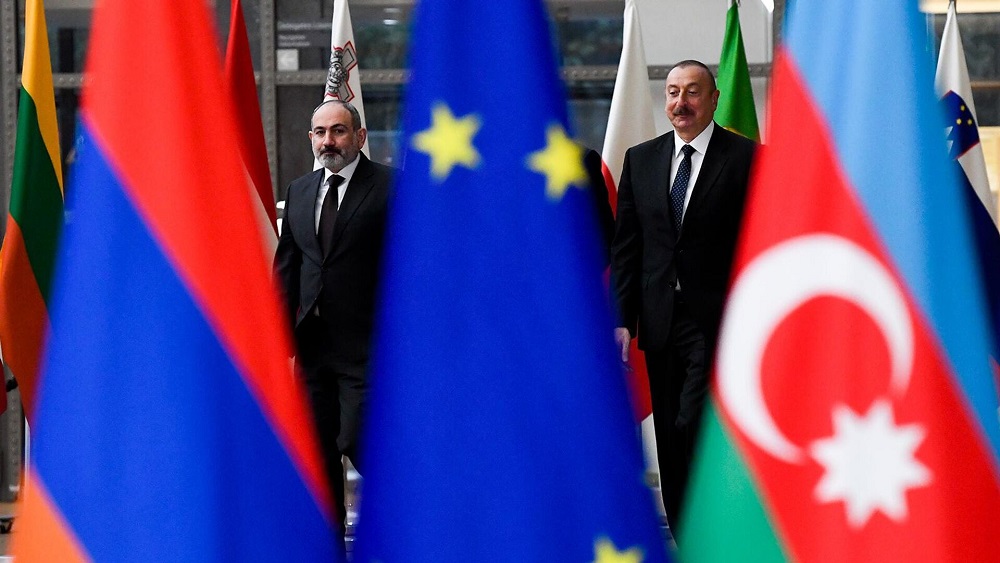"Two scenarios for the South Caucasus: peace or conflict?" View from Baku
Bilateral format of negotiations
A meeting of the delimitation commission was held today on the border between Azerbaijan and Armenia. According to the press service of the Azerbaijani Foreign Ministry, the parties agreed to continue the meetings in bilateral format. Azerbaijani analysts from the South Caucasus Studies Center (CSSC) consider the bilateral format of negotiations under the conditions created in the region as an alternative. “Today’s meeting of the commission on delimitation on the conditional border may become an important step in this direction,” the center’s analytical paper says.
- A trip to the “Alumni House,” whose address even Google Maps doesn’t know
- “The policy of anti-Russian sanctions has been correctly characterized in Georgia as self-deception and madness” – Russian State Duma
- Armenian trucks idle in Upper Lars. Russia’s response to the CSTO boycott?
“There is a certain stagnation in the ongoing peace process between Azerbaijan and Armenia. Despite the continuation of bilateral contacts on the settlement in the form of exchange of e-mails and meeting on the conditional border, there is a break in the high-level negotiation process on the international plane with the participation of mediators,” experts from the CSSC said.
Armenia is dissatisfied with Russia, Azerbaijan with the West
In their opinion, “instead of recognizing the groundlessness of territorial claims to its neighbors and the fallacy of its aggressive foreign policy, Armenia is looking for the reasons for its failures not inside the country, but outside it. Official Yerevan points to Russia as the main culprit of the defeat in the second Karabakh war and the overall collapse of the occupation intentions against Azerbaijan.
On the other hand, Moscow does not recognize as Armenian territory the heights on the conditional border over which the Azerbaijani army regained control in September 2022. It is for these reasons that Armenia is currently avoiding Kremlin mediation in the peace process with Azerbaijan and trying to find new forces to support its so-called assertions in the face of the West.
Azerbaijan, on the other hand, speaking from its national interests, has so far refused Western mediation. The approaches of both Washington and Brussels to the events in the region from Armenia’s position do not comply with the principle of impartiality of mediators. The West does not openly declare that Karabakh belongs to Azerbaijan and does not hide its intentions to replace Russian peacekeepers in the region with its own armed forces. Washington sending missions to Armenia to investigate Armenians who have fled Karabakh calls into question the goodwill of the United States towards Azerbaijan. And the European Union, succumbing to the destructive influence of France, demonstrates a unilateral approach to the peace process, which limits the mediation capabilities of Brussels.”
Non-negotiable two-sided format
“Under such conditions, the bilateral format on settlement between Yerevan and Baku remains non-negotiable. For a long time Azerbaijan has been urging Armenia to discuss interstate relations on a bilateral basis, but these proposals are met with no enthusiasm in Yerevan. But in the conditions of distrust of the parties towards mediators, it seems that the Pashinyan government realizes the lack of alternatives for bilateral meetings, and as always, gradually and cautiously, it is forced to accept Baku’s proposals.
Today’s meeting of the commission on delimitation on the conditional border may become an important step in this direction.”
Peace or conflict?
“The signing of a peace treaty based on the five principles put forward at the initiative of Azerbaijan will first of all increase the subjectivity of the two countries and reduce tensions in the region. A possible agreement would also increase the level of trust between the parties and create their interdependence, which in turn would ensure sustainable peace in the region.
Failure to sign a peace treaty will accelerate the arms race in the region, causing resources that could have been spent on peaceful development to be used for military purposes. At the same time, the legal and diplomatic struggle in international organizations and courts will become even more acute, and the parties will use any suitable occasion to weaken each other’s positions. The absence of a peace treaty will also create conditions for further escalations in the South Caucasus.”
Summary
“Summarizing the above, we believe that despite the stagnation on the international mediation plane, Azerbaijan and Armenia are able to positively conclude the peace process on the basis of bilateral efforts. Baku has extended a hand of reconciliation to Yerevan by taking relevant initiatives. Now it is Yerevan’s turn to choose whether to shake this hand or reject it,” the Azerbaijani analysts conclude.




















